Lockdown! Experiences from Odisha
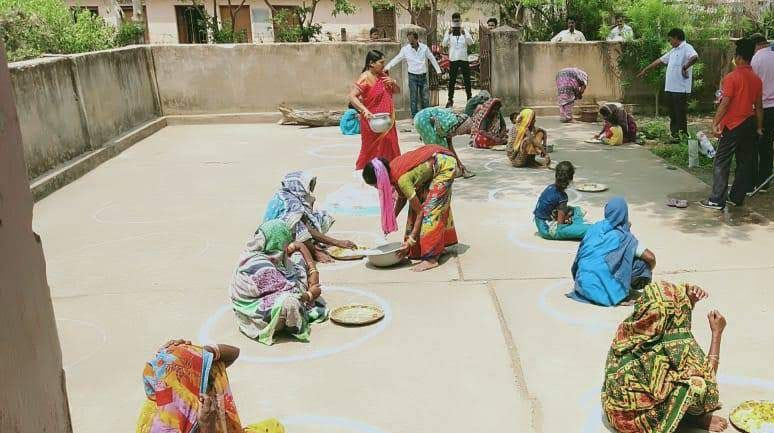
#Jeetenge Hum! PRADAN professionals approached the challenges that the pandemic brought with it by ensuring food for those who had none, motivating villagers to access government schemes, finding innovative solutions for all, including the landless, is a testimony to the buoyancy of the human spirit
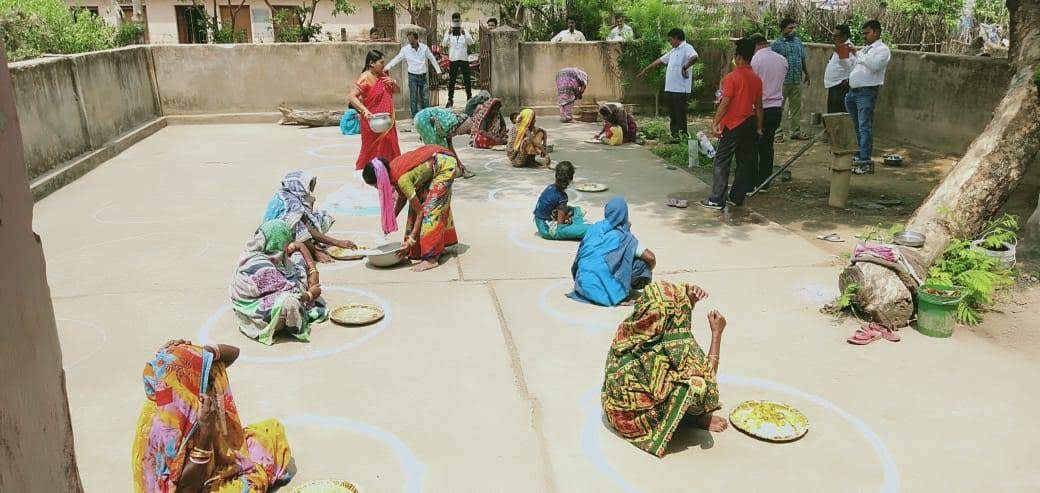
Hot cooked meal at panchayat level
A s the Prime Minister Modi announced the nationwide lockdown on 24 March 2020, our movement in Odisha came to a halt. PRADAN works in the rural hinterlands of Odisha with vulnerable and marginalized families. Our immediate concerns were that no family should suffer from hunger because of the restrictions in the lockdown and that awareness needed to be created within the community about COVID 19. Our movement was also restricted; therefore, we mobilized the community through phone calls. We got in touch with the community cadres through phones, and conducted a quick survey in 1,297 villages, catering to over 1.48 lakh households, and tracking the vulnerable, the hungry and the migrants, in order to ensure the availability of access to the Public Delivery System (PDS) and other government schemes.
The lockdown was a huge setback for the landless villagers, for those who sold forest produce for a living, for daily wage labourers, for farmers unable to sell their produce, etc. We had to mobilize the collectives immediately in this emergency situation. While PRADAN started mobilizing funds, SHG Federations were doing their bit to help the vulnerable. The block-level Federations, Sayansidha and Sampurna of Jashipur and Karanjia, raised 65,000 and 38,000, respectively, through crowd funding to help the hungry. They collaborated with the block administration and the PRI members and reached 120 and 100 vulnerable families in Jashipur and Karanjia blocks, respectively, with a little assistance from PRADAN.
Collaborating with the Administration
D uring the lockdown, the Odisha government actively provided relief services; PRADAN worked along with the local administration, to ensure that no one remains hungry and that relief services reach the villages smoothly. The first task was to conduct a survey and track the vulnerable. The second was to conduct awareness programmes regarding preventive measures in the community. The third task was to help farmers sell their produce, with the help of the departments and the district magistrate. Besides this, the government took quick steps to create awareness through its frontline workers (the ASHA and the anganwadi workers), supplying ration kits for four months, and material to children and pregnant women, distributing money to pension holders, the Pradhan Mantri Ujjwala Yojana, the Jan Dhan account, etc. Regular meetings were conducted at the block level, in the presence of the BDO and other government officers, partner organizations to distribute the responsibilities and to take ongoing stock of the situation.
"Our immediate concerns were that no family should suffer from hunger because of the restrictions in the lockdown and that awareness needed to be created within the community about COVID 19. "
Action taken on the initiatives
T his initiative in collaboration with the government was huge; a quick, sturdy, data-tracking mechanism had to be built to make this work. All the teams met the BDO and the nodal officer of their respective blocks, and developed a mechanism suitable for each block. PRADAN professionals also took the help of these cadres and volunteers for collecting the needed data.
The volunteers were primarily involved in the following tasks:
- Identifying vulnerable families in their villages, that is, those who didn’t have food to feed themselves.
- Collecting details, on a daily basis, of migrant families stranded outside Odisha and details of migrant families, who have returned.
- Keeping track of people to whom PDS, pension, etc. was not given.
- Spreading awareness on hand-wash practices and social distancing in their villages. For example, in Kusumi and Banspal blocks, they used information-education-communication (IEC) material provided by PRADAN, to raise awareness.
Volunteers reported to the district administration daily. Migrants stranded outside the state were directed to the local administration and NGOs; migrants who returned were provided facilities in quarantines rooms; one SHG in each panchayat was assigned the task of cooking food for the hungry, etc. Apart from these, volunteers supported the block staff in maintaining quarantine centres and collecting data whenever needed.
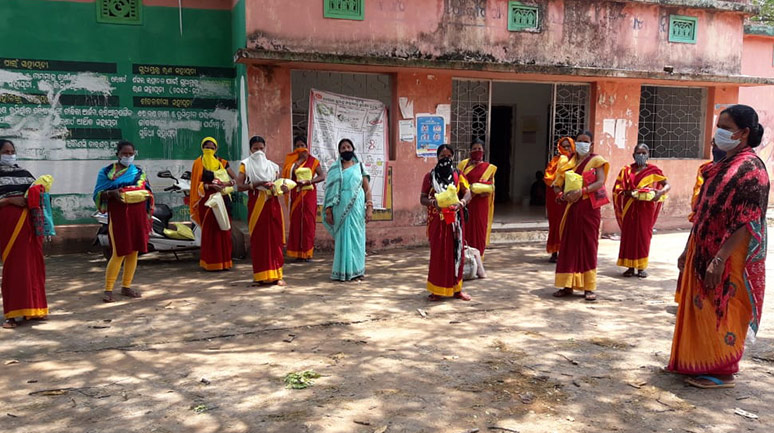
Distribution of material to children and pregnant women
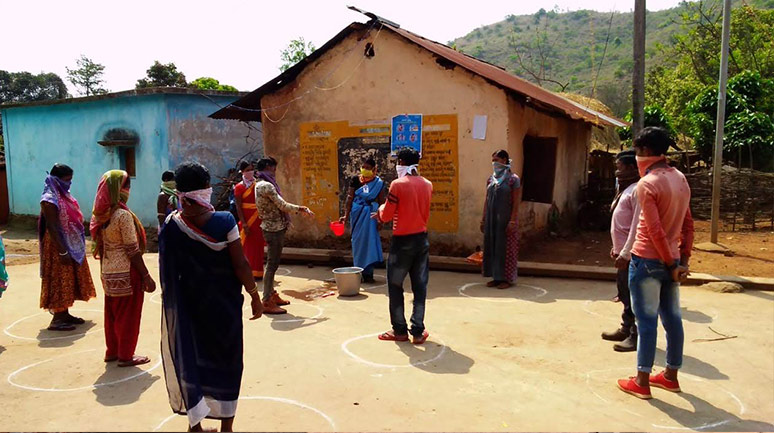
Awareness programmed conducted by ASHA workers at the village level
Case: One of the SHGs (Maa Laxmi Group of Nirbhaya Federation, took up the initiative of making masks for the villagers. The BDO of Kolanara appreciated the venture; he ordered the Federation to make 50,000 masks at Rs 2 per mask, including making charges and material costs. The Federation, thereafter, took up the responsibility, and five SHGs were selected for the supply of masks. Another example of this is an SHG from Barkhama panchayat of Balliguda block.
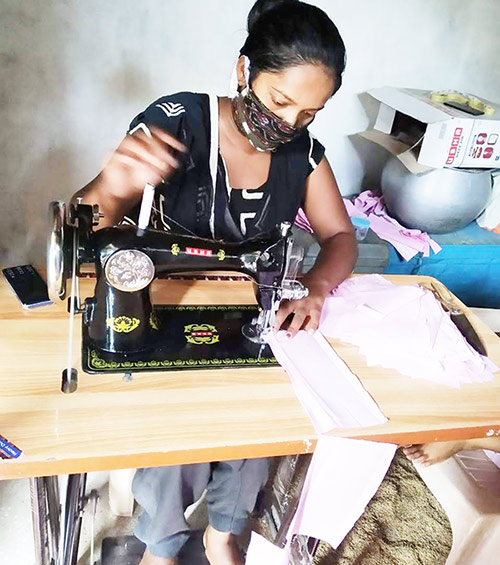
Mask preparation
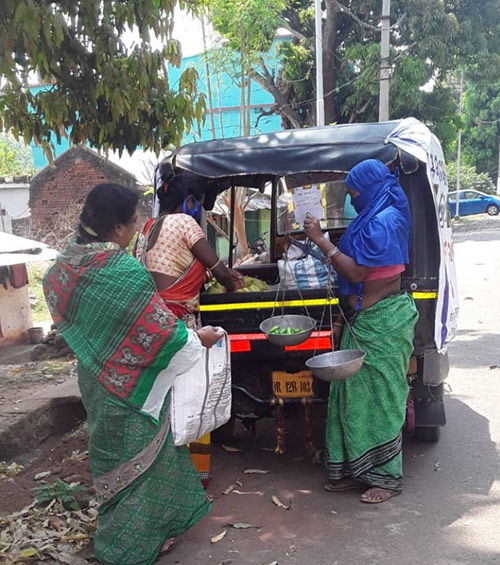
SHG women selling goods in Phulbani
COVID Relief Reachout with the support from APPI, NRTT and Local Funding
| S. No | Components | Physical |
|---|---|---|
| 1 | No. of villages/hamlets, where awareness programmes were conducted | 1,450 |
| 2 | No. of community kitchens supported | 1 |
| 3 | No. of quarantine centres supported | 64 |
| 4 | No. of food kits provided to vulnerable families | 10778 |
| 5 | No. of PPE kits and sanitary items provided | 24,263 |
| 6 | No. of community surveillance cadre working | 89 |
| 7 | No. of villages where record keeping was done | 955 |
| 8 | No. of families supported through various means, including awareness creation | 78,556 |
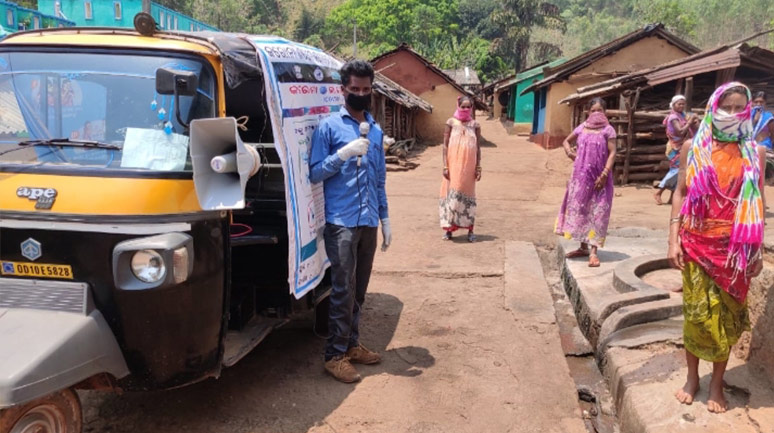
Awareness creation of COVID-19 by PRADAN
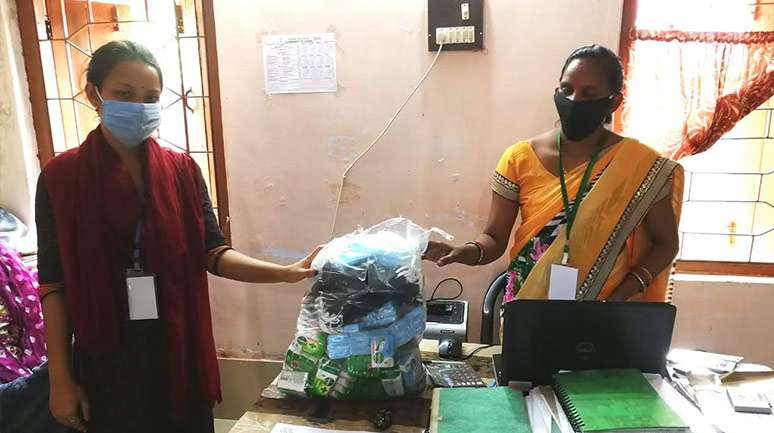
Distribution of PPE kits & sanitary items to frontline workers in Balliguda
Enhancement of Livelihoods
A fter some short-term solutions were in place, the priorities were to enhance the livelihood avenues of the community.
- Livelihood of the community (agriculture, livestock, MGNREGs, etc.)
- Nutrition of the community (especially women and children)
Livelihood of the community (MGNREGS)
A fter the district-level coordination committee meeting held with different NGO partners in the presence of district collector, Project Director(PD), District Rural Development Agency (DRDA) and District Project Manager (DPM), PRADAN started working with block functionaries, to generate a work code of different MGNREGS activities during the lockdown. A total of 8,27,719 job cards have been included in the current year; 44,27,348 job works demanded and 44,22,400 job works offered across Odisha with the help of the Horticulture and other departments.
Individual approved projects such as Land Development under MGNREGS started in some of the villages of Lanjigarh block during the fourth phase of lockdown.
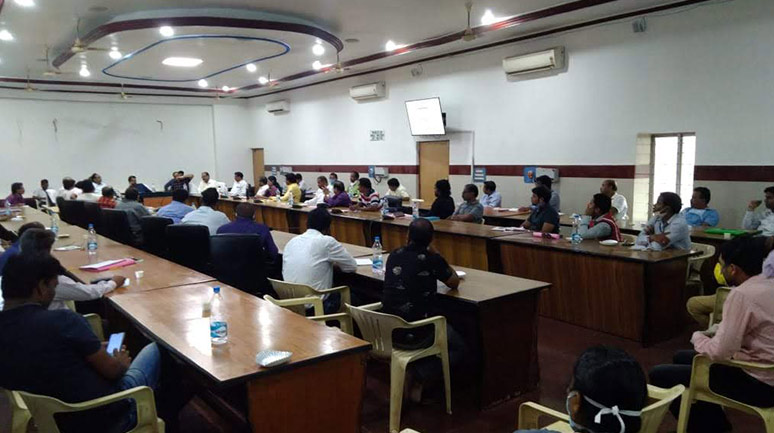
District-level coordination meeting with different NGOs/CSOs on MGNREGS
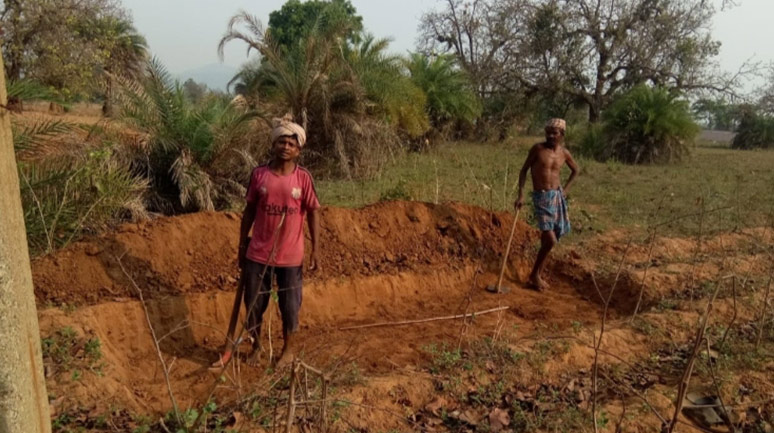
MGNREGs work at Lanjigarh during lockdown
Livelihood of the community (agriculture)
A huge quantity of vegetable produce was to be sold; farmers were finding it difficult to send their goods to larger markets. Traders were contacted and 272 tons of vegetable produce was sold, generating Rs 36 lakhs rupees across different teams of Odisha during the first lockdown period.
Case: Vegetables are the primary source of income for the villagers of Nandapur block. For the last one-and-a-half-months, the villagers’ anguish was doubled by the lockdown and its challenges. Villagers did not have any platform, which adhered to the government’s COVID-19 guidelines, to sell their produce. As a result, the vegetables went waste; moreover, they had to resort to distress sale. PRADAN, Nandapur, in consultation with the concerned government departments, came up with a creative solution by constructing a temporary ‘haat’, taking into considering all the COVID-19 measures. The villagers succeeded in selling 35–40 tonnes of vegetables, with help of the Horticulture Department, the Sarpanch, Nandapur, and the local administration.
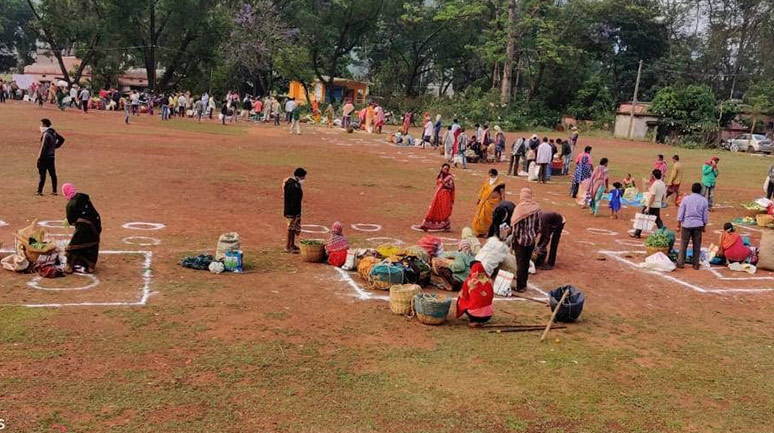
Temporary haat in Nandpur block, organized with the support of the Horticulture Department and the local administration
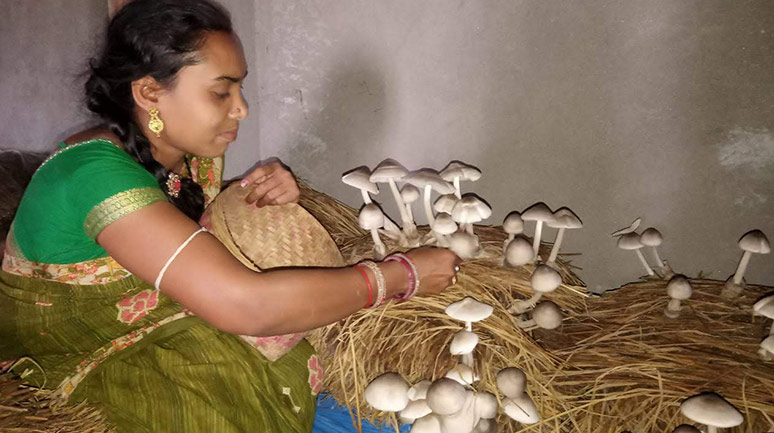
Mushroom cultivation in Lanjigarh
Livelihood of the community (Livestock)
T he focus was on providing medication and other ethno-veterinary practices, preparing fodder, creating a model for backyard poultry (BYP) for the community, with the help of the Livestock Department (for providing medicine) and the ground staff Livestock Inspector (LI). During this crisis, PRADAN, with the help of DRDA and ITDA, has given proposals for creating the infrastructure for BYP and building goat sheds. These will help generate wages for the community under MGNREGS.
Nutrition of the community (especially women and children)
W ith the lockdown and the increased number of family members in the household, the work load of women increased exponentially. However, the decrease in income has made women curtail their food consumption. Nutri-gardens, under the APPI project and MGNREGS, make sure that nutritious food availability is not compromised. The initiative has reached 16,741 households in Odisha. Awareness around every issue is being built through meetings in small groups. PRADAN introduced the ‘bag model’, also known as the landless model, whereby landless farmers (who do not have even 2 decimals of land in their backyard) grow their vegetables in sacks (3 bags each family member) so that they can consume healthy food.
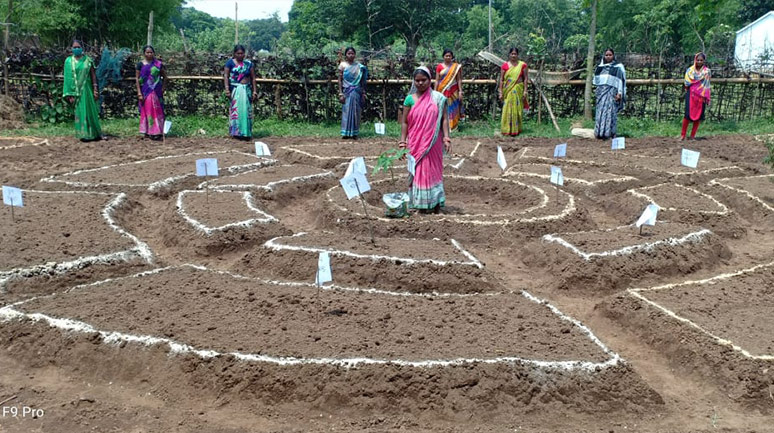
Nutri-garden
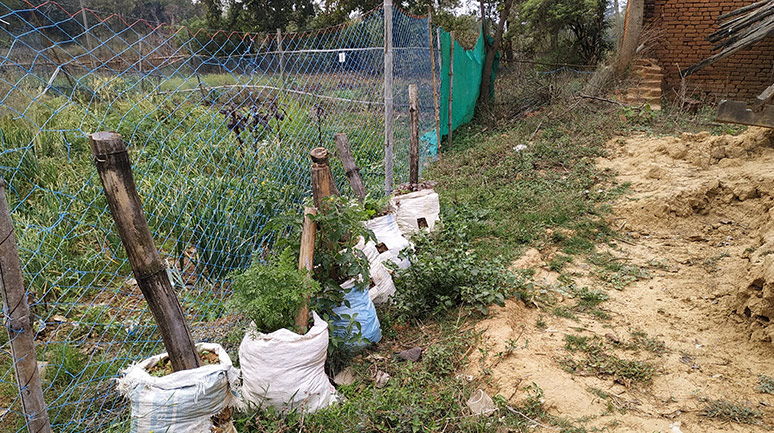
Bag model for those with less than 2 decimals of land
Conclusion
T he current situation is unprecedented. Never was it imagined that a time would come when the entire nation would be locked down. PRADAN was concerned about the villagers suffering because they would not be able to work, avenues for earning a living would shut down and the villagers’ produce would not be sold. The initial days were painful and confusing; yet, the hard times gave rise to new creative strategies, proving the adage ‘where there is a will, there is a way’. Working in collaboration with the district and block administration made things possible. The social and economic impact on the lives of the women in villages in the long run is still to be assessed, and the professionals have begun the process. We shall strive for our best and ultimately win this battle together.#JeetengeHum

